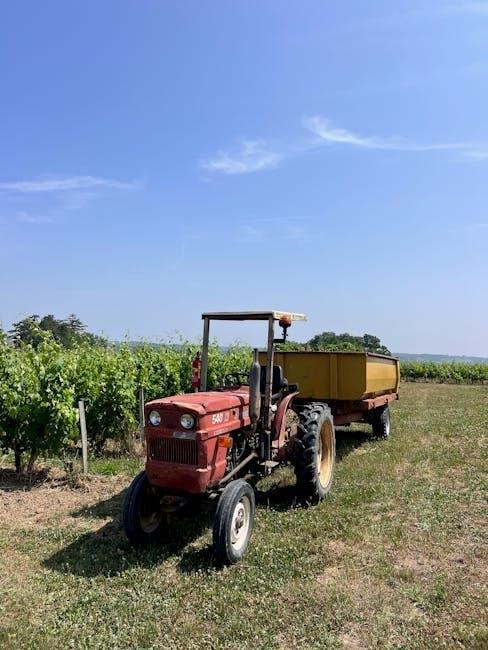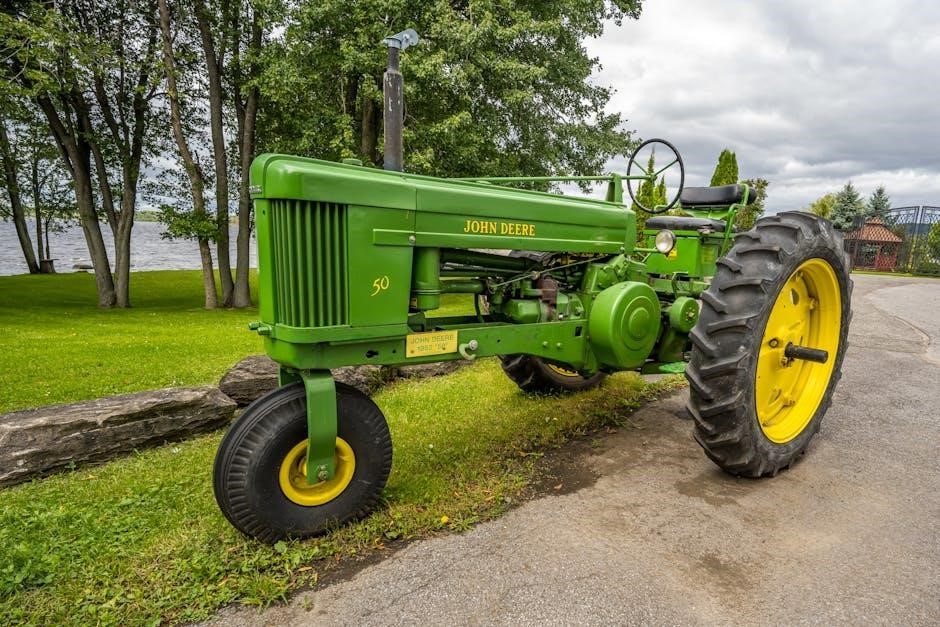The John Deere Tractor Value Guide is an essential resource for understanding the factors that influence tractor pricing. It helps buyers, sellers, and enthusiasts make informed decisions.
1.1 Overview of John Deere Tractors
John Deere tractors are renowned for their durability, innovation, and versatility, catering to a wide range of agricultural and utility needs. From compact utility tractors to high-horsepower models, John Deere offers a diverse lineup. Their tractors are popular among farmers, landscapers, and hobbyists due to their reliability and advanced features. Models like the 1-4 Series and D-Series provide robust performance for various tasks, while sub-compact tractors such as the 1023E are ideal for smaller-scale operations. With a focus on technology and efficiency, John Deere tractors consistently meet the evolving demands of modern agriculture and outdoor work. Their wide horsepower range ensures a model for every requirement.
1.2 Importance of Understanding Tractor Value
Understanding tractor value is crucial for making informed purchasing or selling decisions. It helps determine fair market prices, ensuring buyers avoid overpaying and sellers receive appropriate compensation. Factors like age, usage, and maintenance significantly impact value, making it essential to assess these elements. Additionally, knowing tractor value aids in budgeting, financing, and negotiating deals. For farmers and businesses, accurate valuation can influence profitability and operational efficiency. Similarly, enthusiasts and collectors benefit from understanding value trends to make smart investments. Whether buying, selling, or maintaining, knowing tractor value is key to maximizing returns and ensuring financial stability in agricultural and utility operations.
1.3 Historical Significance of John Deere Tractors
John Deere tractors hold a storied history, beginning with John Deere’s founding in 1837 and the introduction of the first steel plow. The company revolutionized farming with the Waterloo Boy, its first gasoline-powered tractor in 1892. Acquiring the Waterloo Gasoline Engine Company in 1918 marked its official entry into tractor production. The innovation continued with the 1923 introduction of the two-cylinder engine, which became a hallmark of John Deere tractors. Models like the Model D (1923) and Model B (1935) transformed agriculture, offering reliability and power. The Model A (1934) catered to small farms, while the Model M (1947) introduced hydraulic systems. This legacy of innovation solidified John Deere’s reputation as a leader in agricultural machinery, shaping modern farming practices worldwide.
Factors Influencing John Deere Tractor Value
The value of John Deere tractors is shaped by age, usage, condition, model specifics, and market demand; These factors collectively determine the tractor’s worth and resale potential.
2;1 Age and Model Year
The age and model year significantly impact John Deere tractor value. Newer models, such as those from 2021 to 2024, often retain higher resale value due to advanced features and technologies. Recent tractors with low operating hours command premium prices, while older models may see depreciation. Historical data shows that tractors like the John Deere 8285R, produced in 2023, have set record auction prices, emphasizing the demand for modern machinery. Conversely, classic models from earlier decades, such as the John Deere Model 60, hold value for collectors but differ in market appeal. The model year reflects technological advancements, influencing both performance and pricing trends in the market.
2.2 Usage and Operating Hours
Usage and operating hours are critical factors in determining a John Deere tractor’s value. Lower-hour tractors, such as those with less than 1,000 hours, typically hold higher value and attract premium prices. Conversely, tractors with excessive usage may show wear and tear, reducing their worth. For instance, a John Deere 8285R with 1,225 hours recently sold for a record $250,000, while higher-hour models may experience depreciation. Buyers often prioritize tractors with well-documented service histories and minimal wear, ensuring reliability and longevity. High operating hours can signal potential maintenance needs, impacting resale value and buyer interest in the competitive tractor market.
2.3 Condition and Maintenance History
The condition and maintenance history of a John Deere tractor significantly impact its value. Well-maintained tractors with clean records retain higher resale value, as they demonstrate reliability and longevity. Regular servicing, proper storage, and timely repairs are essential for preserving a tractor’s condition. A tractor with a clean appearance and minimal wear often attracts higher bids at auctions or private sales. Conversely, tractors with neglected maintenance or visible damage may sell for 30% less. Buyers typically prioritize tractors with detailed service logs and a history of consistent upkeep. A well-documented maintenance history can substantially enhance a tractor’s appeal and value in the market.
2.4 Specific Tractor Model and Features
Specific tractor models and their features play a crucial role in determining value. Advanced models like the John Deere 8285R, with its high horsepower and modern technology, command premium prices. Features such as GPS guidance, automatic transmissions, and high-capacity hydraulics increase demand and value. Additionally, specialized attachments and implements tailored to specific agricultural tasks boost a tractor’s utility and resale worth. Certain models, like the sub-compact 1023E, are highly sought after for their versatility and efficiency, further influencing their market value. The combination of model reputation and feature-rich specifications ensures that certain John Deere tractors stand out in terms of desirability and pricing.
2.5 Market Trends and Demand
Market trends and demand significantly influence John Deere tractor values. Recent data shows a surge in prices for high-horsepower models like the 8285R, driven by their popularity in large-scale farming. Sub-compact tractors, such as the 1023E, are also in high demand due to their versatility for small-scale agriculture and landscaping. The agricultural industry’s growth and technological advancements in tractor design further fuel demand. Seasonal fluctuations and regional farming practices also play a role. Additionally, inflation and economic conditions impact purchasing power, affecting overall market trends. Despite these factors, John Deere’s reputation for quality ensures consistent demand across its tractor lineup.

Online Resources for John Deere Tractor Valuation
Online platforms like Equipment Trader, IronGuides, and John Deere’s Build and Price tool provide detailed tractor valuations, price comparisons, and market trend insights for informed decisions.
3.1 Equipment Trader: Inventory and Price Comparison
Equipment Trader is a premier platform for comparing prices and inventory of John Deere tractors. It offers a comprehensive listing of both new and used models, allowing users to filter by year, model, and features. This tool is invaluable for buyers seeking specific tractors or those exploring options within a budget. By providing detailed specs and pricing, Equipment Trader enables informed decision-making. Additionally, it highlights market trends, helping sellers understand current demand and pricing dynamics. Whether you’re comparing John Deere tractors or exploring competitive brands, Equipment Trader streamlines the process, making it easier to find the best value for your needs.
3.2 IronGuides: Equipment Value Guide
IronGuides offers a detailed Equipment Value Guide, providing insights into John Deere tractor valuations. It features pricing data for models like the 8285R and 1023E, highlighting market trends and auction records. Users can access reports on specific tractors, including historical sales data and current market demand. The guide also covers factors influencing tractor value, such as age, condition, and features. IronGuides is a trusted resource for both buyers and sellers, helping them determine fair prices and make informed decisions. Regular updates ensure the data remains relevant, reflecting the latest industry shifts and buyer preferences in the agricultural machinery market.
3.3 Auction Results and Market Data
Auction results and market data provide valuable insights into the current value of John Deere tractors. Recent sales data shows that models like the John Deere 8285R have achieved record prices, such as $250,000 in Marion, N.Y; These records highlight the demand for high-performance tractors. Market trends indicate fluctuations in tractor values, with some models experiencing price decreases due to economic factors. Auction platforms and market analytics tools offer detailed reports on recent sales, helping buyers and sellers assess fair market prices. This data is crucial for making informed decisions when purchasing or selling John Deere tractors, ensuring transactions are competitive and realistic.
3.4 Build and Price Tool by John Deere
John Deere’s Build and Price Tool is a powerful resource for customizing and valuing tractors. Users can select specific models, configure options, and add attachments to create their ideal tractor. This tool provides detailed pricing reports, helping buyers understand the cost of new and used models. It also allows comparison of different configurations, making it easier to assess value based on features and accessories. The tool is particularly useful for those looking to purchase or sell, as it offers transparency in pricing and helps determine fair market values. This feature-rich platform ensures that users can make informed decisions tailored to their needs and budget.
John Deere Tractor Model-Specific Value Guide
This section provides detailed pricing trends and analysis for specific John Deere tractor models, helping users evaluate their value based on features, horsepower, and market demand.
4.1 John Deere 8285R: Price Trends and Auction Records
The John Deere 8285R has shown notable price trends in recent auctions, with a unit selling for $250,000 in March 2023 in Marion, NY, featuring 1,225 hours. Another 8285R sold for $235,000 in November 2023 with 1,400 hours, indicating a slight depreciation pattern. These records highlight the model’s high value, driven by its 225 HP engine and advanced features. Auction data reveals that low-hour, well-maintained units retain premium pricing, while higher-hour tractors experience gradual value decline. This model remains a top choice for heavy-duty applications, reflecting strong market demand for high-performance tractors.
- Average auction price: $225,000 ⎻ $250,000
- Key factors: Model year, operating hours, and maintenance history
4.2 John Deere 1023E: Sub-Compact Tractor Pricing
The John Deere 1023E, a sub-compact tractor, is priced affordably for small-scale farming and landscaping. New models typically range from $15,000 to $20,000, depending on features and attachments. Used models, with varying hours, can be found between $10,000 and $18,000. Financing options and seasonal discounts often reduce upfront costs. Its 23 HP engine and hydrostatic transmission make it ideal for light tasks. The 1023E’s value is sustained by its durability and versatility, making it a popular choice for hobby farmers and homeowners seeking reliable, compact equipment.
- New price range: $15,000 ⸺ $20,000
- Used price range: $10,000 ⸺ $18,000
4.3 John Deere D-Series: Value and Features
The John Deere D-Series tractors are known for their durability and versatility, offering excellent value for small to medium-sized farming operations. These models, such as the D105 and D110, feature powerful engines, 4-wheel drive capability, and hydrostatic transmissions, making them ideal for tasks like mowing, landscaping, and light agricultural work. The D-Series is praised for its ease of use and reliability, maintaining strong resale value. Prices for new models typically range from $2,000 to $5,000, while used models can be found for $1,500 to $3,500, depending on condition and features. Regular maintenance and upgrades can further enhance their value and performance.
- Durable construction and reliable performance
- Cost-effective for small-scale farming needs
4.4 John Deere E-Series: Market Value Analysis
The John Deere E-Series tractors are highly regarded for their compact size, versatility, and reliability, making them a popular choice for small farms and landscaping tasks. Market analysis shows that these tractors hold their value well, with prices ranging from $15,000 to $30,000 for new models, depending on features and horsepower. Used E-Series tractors, such as the 2018-2022 models, typically sell for $10,000 to $25,000. Factors like maintenance history and additional attachments significantly impact resale value. The E-Series is in strong demand, ensuring stable market prices. Buyers often favor models with lower operating hours and well-documented service records, which can command premium prices.
4.5 John Deere 1-4 Series: Compact Utility Tractors
The John Deere 1-4 Series are compact utility tractors designed for small farms, landscaping, and light agricultural tasks. These models, ranging from 25 to 66 horsepower, are known for their versatility and ease of use. With a focus on affordability and reliability, they are popular among homeowners and small-scale farmers. The 1-4 Series offers a range of attachments, making them adaptable for various jobs. Market values for these tractors remain stable, with new models priced between $15,000 and $35,000, and used models ranging from $8,000 to $20,000. Proper maintenance and additional features significantly enhance resale value, ensuring long-term investment potential.

Maintaining and Increasing Tractor Value
Maintaining a tractor’s condition and history is crucial for preserving value. Regular servicing, proper storage, and avoiding excessive wear ensure longevity and higher resale potential.
5.1 Regular Maintenance and Servicing
Regular maintenance is vital for preserving tractor value. Adhering to John Deere’s recommended service schedules ensures optimal performance and prevents costly repairs. Routine checks on fluids, filters, and tires maintain efficiency. Proper servicing also extends the lifespan of components, reducing wear and tear. A well-maintained tractor attracts higher resale value, as buyers prioritize reliability and durability. Keeping detailed service records further enhances credibility, showcasing a commitment to upkeep. Consistent care not only protects your investment but also ensures the tractor remains operational for years, making it a valuable asset for agricultural or utility tasks.
5.2 Upgrades and Customizations
Upgrades and customizations can significantly enhance a John Deere tractor’s value by improving functionality and appeal. Adding advanced features like GPS, precision agriculture tools, or upgraded hydraulics can attract tech-savvy buyers. Cosmetic improvements, such as new paint or updated interiors, can also boost resale value. However, modifications should align with the tractor’s intended use and target market. Over-customization without practical purpose may not yield a strong return on investment. Strategic upgrades, such as installing popular attachments or improving comfort, can make the tractor more desirable. Always consider the cost-benefit ratio to ensure upgrades positively impact the tractor’s overall worth.
5.3 Proper Storage and Protection
Proper storage and protection are crucial for maintaining a John Deere tractor’s value. Always clean the tractor thoroughly before storing it to prevent dirt and debris from causing damage. Use a high-quality cover to shield it from dust and moisture. Store the tractor in a dry, sheltered area away from direct sunlight to avoid paint fading. Avoid exposure to extreme temperatures, which can harm electrical components. Additionally, protect the tractor from pests by sealing entry points. Regularly inspect stored tractors to ensure they remain in good condition. Proper storage not only preserves functionality but also enhances resale value by maintaining its appearance and performance.
5.4 Importance of Documentation
Documentation plays a vital role in maintaining and enhancing a John Deere tractor’s value. Keep detailed records of maintenance, repairs, and upgrades to provide transparency for potential buyers. Service histories from certified dealers or mechanics add credibility and trust. Original purchase receipts and warranty information should also be preserved. Organize all documents neatly and ensure they are easily accessible. Proper documentation not only demonstrates responsible ownership but also highlights the tractor’s condition, which can significantly impact its resale value. A well-documented tractor often commands higher prices and attracts serious buyers, making the sales process smoother and more efficient.

Tips for Buying a John Deere Tractor
Research models, compare features, and set a budget. Inspect tractors thoroughly, check maintenance history, and compare prices at multiple dealers. Negotiate wisely for the best deal.
6.1 Researching Models and Features
Researching John Deere tractor models and their features is crucial for making an informed purchase. Start by identifying the tractor’s intended use, such as farming, landscaping, or utility work. Compare models like the John Deere 1023E sub-compact tractor for smaller tasks or the 8285R for heavy-duty farming. Review specifications, including horsepower, transmission types, and implement compatibility. Check online resources like Equipment Trader for model comparisons and IronGuides for detailed equipment valuations. Understanding the features and capabilities of each model ensures you select the right tractor for your needs. Additionally, explore John Deere’s Build and Price Tool to customize your tractor with desired attachments and upgrades.
6.2 Comparing Prices and Dealers
Comparing prices and dealers is essential to finding the best value for your John Deere tractor. Use online platforms like Equipment Trader to view inventory and price comparisons across different dealers. IronGuides provides detailed valuations, helping you assess fair market prices. Consider visiting multiple dealerships to negotiate and compare offers. Auction results and recent sales data can also guide your pricing expectations. Be sure to inquire about warranties, after-sales support, and any additional features or upgrades. This research ensures you make an informed decision and secure the best deal for your tractor purchase. Always verify pricing trends and dealer reputations before committing.
6.3 Inspecting Used Tractors
Inspecting a used John Deere tractor is crucial to ensure its value and performance. Start by checking the exterior for signs of damage or wear. Look for rust, dents, or hydraulic leaks. Examine the tires for tread depth and uneven wear. Inspect the engine for cleanliness and signs of overdue maintenance. Check the hydraulic and transmission systems for functionality. Review the tractor’s history, including service records and operating hours. Test the tractor in operation to ensure all features work smoothly. A thorough inspection helps avoid costly repairs and ensures you’re getting a reliable machine. Always consider a professional evaluation for added peace of mind.
6.4 Negotiation Strategies
When negotiating the purchase of a John Deere tractor, it’s essential to approach the process strategically. Research the market value using tools like Equipment Trader or IronGuides to understand fair pricing. Know the tractor’s asking price and identify its flaws or needed repairs to leverage negotiations. Start with a lower offer than your maximum budget and be willing to compromise. Highlight any maintenance or upgrade costs to justify your offer. Stay flexible and open to counteroffers. Consider professional evaluations to strengthen your position. Remember, negotiation is a dialogue, so maintain a respectful and collaborative tone to achieve a mutually beneficial agreement.

Selling Your John Deere Tractor
Selling a John Deere tractor requires determining the right asking price, preparing the tractor for sale, and selecting the best platform to attract potential buyers.
7;1 Determining the Right Asking Price
Determining the right asking price for your John Deere tractor is crucial for a successful sale. Research current market values using tools like Equipment Trader and IronGuides, which provide detailed pricing reports based on model year, usage, and condition. Consider auction results and compare similar models to gauge demand. Additionally, factor in any upgrades or customizations that enhance the tractor’s value. A well-priced tractor attracts serious buyers and ensures a fair deal. Accurate pricing reflects the tractor’s true worth, balancing profitability for sellers and affordability for buyers.
7.2 Preparing Your Tractor for Sale
Preparing your John Deere tractor for sale involves thorough cleaning and maintenance to maximize its appeal. Start with a detailed wash and wax to restore its exterior shine. Address any mechanical issues, such as faulty hydraulics or worn tires, to ensure optimal performance. Organize all documentation, including service records and repair history, to build trust with potential buyers. Highlight any upgrades or customizations that add value. Consider staging the tractor in a clean, well-lit environment for photography. Presenting a well-maintained and visually appealing tractor attracts serious buyers and supports your asking price, making it easier to close a successful sale.
7.3 Choosing the Right Sales Platform
Choosing the right sales platform is crucial for selling your John Deere tractor effectively. Online marketplaces like Equipment Trader and IronGuides allow you to list your tractor alongside similar models, enabling price comparisons and reaching a broad audience. Auction sites can attract competitive bidding, potentially increasing your sale price. Dealer networks often have certified pre-owned programs, ensuring your tractor meets quality standards and appeals to trusted buyers. Classified platforms like Craigslist or local farm directories can connect you with nearby buyers. Consider the fees, audience reach, and support each platform offers to maximize visibility and profitability for your tractor sale.
7.4 Negotiation Tips for Sellers
When negotiating the sale of your John Deere tractor, it’s essential to approach the process confidently and strategically. Start by researching current market values using tools like Equipment Trader or IronGuides to set a realistic baseline. Be transparent about the tractor’s condition and maintenance history to build trust with potential buyers. Consider offering flexible payment terms or including additional accessories to sweeten the deal. Know your minimum acceptable price and be prepared to justify it with documentation. Highlight the tractor’s unique features or upgrades to differentiate it from similar models. Finally, stay patient and professional throughout the negotiation process to secure a fair and satisfactory sale.
Financing Options for John Deere Tractors
Financing options for John Deere tractors include special offers, loans, lease options, payment plans, and understanding interest rates to help buyers afford their purchases.
8.1 Special Financing Offers
John Deere offers special financing options to make tractor purchases more accessible. These include low-interest loans, cash rebates, and discounted rates for eligible models like the 1023E. Buyers can benefit from promotional periods, such as zero-interest financing for the first year or deferred payments. Additionally, John Deere often partners with financial institutions to provide tailored solutions, ensuring buyers can afford their desired tractors. These offers are typically advertised seasonally or during major agricultural events, making it crucial for buyers to stay informed about current promotions. Taking advantage of these deals can significantly reduce the overall cost of acquiring a John Deere tractor.
8.2 Loans and Lease Options
John Deere offers flexible financing solutions, including loans and lease options, to cater to different buyer needs. Loans provide fixed rates and terms, allowing buyers to own their tractors outright over time. Leasing options, on the other hand, enable farmers and businesses to use the equipment without upfront costs, with payments based on usage. Both options are designed to fit various budgets and operational requirements. Buyers can explore these financing solutions through John Deere Financial or partner institutions, ensuring affordable access to high-quality tractors. These options are particularly beneficial for those seeking to manage cash flow while acquiring essential agricultural machinery.
8.3 Payment Plans and Discounts
John Deere offers tailored payment plans and discounts to make tractor ownership more accessible. Buyers can choose from flexible payment schedules, including fixed-rate installments, to suit their financial needs. Discounts are often available for first-time buyers, military personnel, or students, reducing upfront costs. Additionally, seasonal promotions and bundle deals on implements or attachments can lower the overall price. Loyalty programs for returning customers may also provide exclusive savings. Low-interest financing options and cash-back incentives further enhance affordability; These payment plans and discounts help buyers manage their budgets effectively while acquiring high-quality John Deere tractors for their agricultural or landscaping needs.
8.4 Understanding Interest Rates
Understanding interest rates is crucial when financing a John Deere tractor. Interest rates determine the total cost of ownership and monthly payments. Lower rates reduce financial burden, while higher rates increase expenses. Rates vary based on creditworthiness, loan terms, and market conditions. John Deere offers competitive financing options, often with promotional rates for qualified buyers. It’s essential to compare rates from different lenders and consider long-term implications. Buyers should also review loan agreements for hidden fees or penalties. Transparent interest rate structures ensure buyers make informed decisions, aligning with their budget and financial goals. Always consult with financial advisors to optimize your financing strategy.
The John Deere Tractor Value Guide provides a comprehensive overview of factors influencing tractor value, including model year, usage, and maintenance. It also covers financial considerations like interest rates and incentives, ensuring informed decisions for buyers and sellers alike.
9.1 Summary of Key Points
The John Deere Tractor Value Guide offers insights into determining tractor value, emphasizing factors like age, condition, and market demand. It highlights online resources such as Equipment Trader and IronGuides for accurate valuations. The guide also provides model-specific pricing trends, tips for maintaining tractor value through proper maintenance and storage, and strategies for buying and selling. Additionally, it explores financing options, including loans and special promotions. By understanding these elements, buyers and sellers can make informed decisions, ensuring fair transactions and maximizing value. This comprehensive resource is essential for anyone involved in the John Deere tractor market.
9;2 Final Tips for Buyers and Sellers
For buyers, research models thoroughly, compare prices, and inspect used tractors for condition and maintenance history. Utilize online valuation tools like IronGuides and Equipment Trader for accurate pricing. Negotiate effectively, considering market trends and demand. For sellers, ensure tractors are well-maintained, documented, and priced competitively. Highlight special features and upgrades to attract buyers. Consider listing on multiple platforms and be prepared for negotiations. Both parties should stay informed about market trends and financing options. Proper documentation and transparency are key to successful transactions. By following these tips, buyers and sellers can achieve fair and satisfactory outcomes in the John Deere tractor market.
